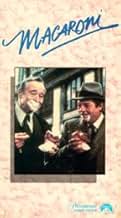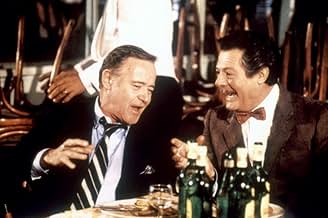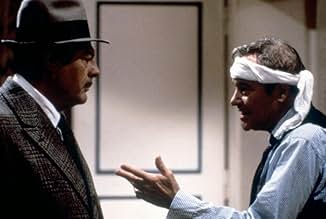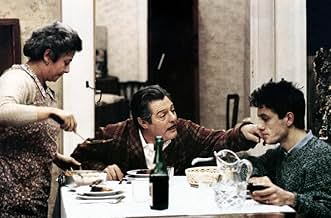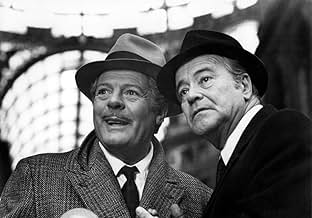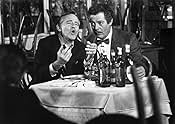IMDb RATING
6.4/10
910
YOUR RATING
A businessman from the United States returns to Italy for the first time in four decades, only to discover that old friends have involved him in a massive hoax.A businessman from the United States returns to Italy for the first time in four decades, only to discover that old friends have involved him in a massive hoax.A businessman from the United States returns to Italy for the first time in four decades, only to discover that old friends have involved him in a massive hoax.
- Director
- Writers
- Stars
- Awards
- 1 win & 5 nominations total
- Director
- Writers
- All cast & crew
- Production, box office & more at IMDbPro
Featured reviews
The conceit of this odd little film is that to experience family love the late-middle-aged American man must return whence he found it -- to Italy of course!
The score is lovely but the sound quality execrable. The comedy hits Americans sideways but the location shots of Naples are breathtaking. (What can Florence be like?)
The storyline is all over the place but then it doesn't matter because we are spellbound by every scene where Lemmon and Mastroianni are together. Both are at the top of their form, not out of any sense of competing, but rather out of respect -- to their characters, to their director, and to each other.
Lemmon is the most restrained I've ever seen him. His tendency to be seen working is quelled, perhaps, by Mastroianni's generous willingness to cede the center of the stage.
So what we have is a little movie with a somewhat pretentious theme that nevertheless, because of its idiosyncrasies and contradictions, and especially because of the performances of its leads, is well worth viewing.
The score is lovely but the sound quality execrable. The comedy hits Americans sideways but the location shots of Naples are breathtaking. (What can Florence be like?)
The storyline is all over the place but then it doesn't matter because we are spellbound by every scene where Lemmon and Mastroianni are together. Both are at the top of their form, not out of any sense of competing, but rather out of respect -- to their characters, to their director, and to each other.
Lemmon is the most restrained I've ever seen him. His tendency to be seen working is quelled, perhaps, by Mastroianni's generous willingness to cede the center of the stage.
So what we have is a little movie with a somewhat pretentious theme that nevertheless, because of its idiosyncrasies and contradictions, and especially because of the performances of its leads, is well worth viewing.
Lemmon and Mastronianni...what can I say? This is an explosive mixture, one of the best European actors with one of the best American actors.... no comments. Both their roles are great and did not expect less. From the movie I was expecting a different ending although it was not disappointing it left me with the bitter taste. Good comic and drama mix of Scolla.
Macaroni follows the renewal of friendship bewtween two men who have not seen each other since WWII. The only not-so-good part of the movie is that it is very predictable. It is never too hard to guess what will happen next. Some may enjoy these types of film however I would rather be challenged!
The wonderful part of this film is the pairing of Lemmon and Mastroianni. They are wonderful together. I have not laughed this hard watching a movie in a long time. Trust me, you will be rolling on the floor. But it is not all fun and games, there is a serious message. Watch it and find out!
The wonderful part of this film is the pairing of Lemmon and Mastroianni. They are wonderful together. I have not laughed this hard watching a movie in a long time. Trust me, you will be rolling on the floor. But it is not all fun and games, there is a serious message. Watch it and find out!
My review was written in October 1985 after watching the film at a Columbus Circle screening room.
"Macaroni" is a mild comedy-drama teaming the formidable talents of Jack Lemmon and Marcello Mastroianni. Stronger in expression of honest sentiment than in its humorous component, the picture faces weak theatrical prospects via Paramount release as a pickup. It was originally scheduled to be an HBO Premiere Films presentation domestically (a slot it would fill comfortably) until the pay-cable outfit dropped out of the project.
Jack Lemmon toplines as Bob Traven (the joke on the mysterious novelist B. Traven's name is never explicit here), a v.p. At McDonnell Douglas visiting Naples as a consultant to Aeritalia. It's his first time back since 1946 when, as a G.i., he was stationed there.
As an acquaintance from that period whom he has completely forgotten, Antonio Jasiello (Marcello Mastroianni) looks Traven up and takes the at-first unwilling (too busy) American around town to meet the family and friends.
It seems that everybody knows Traven, because Jasiello has been surreptitiously writing letters using Traven's name over the years to his own sister Maria, who had a brief romance in 1946 with the American. She's long-since been married and now has adult grandchildren.
Relying too heavily on its two stars, at first abrasive adversaries but later best of friends as Lemmon unbends to Mastroianni's exuberant joie de vivre, "Macaroni" rarely achieves the comedic heights of director Ettore Scola's previous work. There simply isn't an abundance of funny situations or witty dialog here.
Best sequence has amateur playwright Mastroianni filling in as the villain in one of his monthly poverty productions. Heavily made-up (and looking oddly like the late Ernie Kovacs), Mastroianni is genuinely funny in the brief skit acted with Italian dialog.
Elsewhere, this English-language film is hampered by the dialog, with merely okay readings by Mastroianni, artificial dubbing of Isa Danieli as his empathetic wife and rote, direct-sound speeches by Daria Nicolodi as Aeritalia's p.r. Officer. Thesps' acting is okay but diluted by the language distraction.
Lemmon throws himself into his role with customary passion, pumping life into some routine scenes. Pic would have benefited from some period flashback material set in 1946 (especially given Scola's work in his 1974 "We All Loved Each Other So Much") but is rooted in the present. A contrived, melancholy ending doesn't come off.
Tech credits are merely adequate, with Naples' natural beauty shining through Claudio Ragona's strictly functional photography.
"Macaroni" is a mild comedy-drama teaming the formidable talents of Jack Lemmon and Marcello Mastroianni. Stronger in expression of honest sentiment than in its humorous component, the picture faces weak theatrical prospects via Paramount release as a pickup. It was originally scheduled to be an HBO Premiere Films presentation domestically (a slot it would fill comfortably) until the pay-cable outfit dropped out of the project.
Jack Lemmon toplines as Bob Traven (the joke on the mysterious novelist B. Traven's name is never explicit here), a v.p. At McDonnell Douglas visiting Naples as a consultant to Aeritalia. It's his first time back since 1946 when, as a G.i., he was stationed there.
As an acquaintance from that period whom he has completely forgotten, Antonio Jasiello (Marcello Mastroianni) looks Traven up and takes the at-first unwilling (too busy) American around town to meet the family and friends.
It seems that everybody knows Traven, because Jasiello has been surreptitiously writing letters using Traven's name over the years to his own sister Maria, who had a brief romance in 1946 with the American. She's long-since been married and now has adult grandchildren.
Relying too heavily on its two stars, at first abrasive adversaries but later best of friends as Lemmon unbends to Mastroianni's exuberant joie de vivre, "Macaroni" rarely achieves the comedic heights of director Ettore Scola's previous work. There simply isn't an abundance of funny situations or witty dialog here.
Best sequence has amateur playwright Mastroianni filling in as the villain in one of his monthly poverty productions. Heavily made-up (and looking oddly like the late Ernie Kovacs), Mastroianni is genuinely funny in the brief skit acted with Italian dialog.
Elsewhere, this English-language film is hampered by the dialog, with merely okay readings by Mastroianni, artificial dubbing of Isa Danieli as his empathetic wife and rote, direct-sound speeches by Daria Nicolodi as Aeritalia's p.r. Officer. Thesps' acting is okay but diluted by the language distraction.
Lemmon throws himself into his role with customary passion, pumping life into some routine scenes. Pic would have benefited from some period flashback material set in 1946 (especially given Scola's work in his 1974 "We All Loved Each Other So Much") but is rooted in the present. A contrived, melancholy ending doesn't come off.
Tech credits are merely adequate, with Naples' natural beauty shining through Claudio Ragona's strictly functional photography.
Pasta, as the staple food of all Italian households, serves as the symbol of that which sustains us physically. And life long relationships is what defines each and every one of us. In this respect, watching Mastroianni as Antonio and Lemmon as Robert is like watching two master painters at work creating a human landscape spanning decades.
In Antonio, Mastroianni reveals a man of integrity, caring, love and a sense of what makes us all human. Juxtaposed in Robert, Lemmon initially shows us a tired, bitter and disconnected man who no longer sees the real beauty in life. One cannot find two more opposite men at their respective stages in life. But it is here that the audience enters into their world or re-discovery.
As always, Jack Lemmon inhabits the soul of his character (Robert) while portraying the angst felt by a man in deep internal turmoil. But being the great actor Lemmon always displayed, he does not leave us with this one dimensional view of Robert. Rather Lemmon takes us, as the film progresses, on a journey into his re-discovery of a time in his life when happiness was real, taken for granted and lost. And in that realization, Lemmon gives us the real bitterness of his character. Having once loved Antonio's sister during his days in the Army while stationed in Italy, Robert knew, perhaps for the only time in his life, real joy and kinship with others.
Mastroianni gives a masterful performance of a dedicated bank employee who while he is not rich monetarily is rich in the knowledge of the love and respect he enjoys from family and friends. When Robert returns to Italy on a business trip in the present day, Antonio becomes overjoyed with the thought of rekindling the friendship he once shared with Robert. Mastroianni plays, with youthful enthusiasm, his excitement in seeing his 'old friend' Robert again. Antonio, in his simple way, has never lost sight of the true wealth of life. It is in this simplicity that Robert finds, at first, exasperation and then regret.
But watching these two masters of cinema go to work with their characters is liking watching a sculptor taking a lump of stone and turning it into a recognizable form. Lemmon and Mastroianni take the basis of their characters and give a master class in blending the two diverse characters. It is in this blending that both Antonio and Robert learn the real lesson in life - people's lives may change but their core does not. In the end, Antonio is aided by Robert who understands the importance of taking swift action to save Antonio's son who has gotten involved with some unsavory characters. Antonio comes to realize that his friend never stopped caring for him, he was just side tracked by his life in America. For Robert, he has once again felt that exhilaration that we can all know if we allow ourselves. And that is the exhilaration of unconditional, ever present love by friends and family which is the basis of all human relationships.
The final scene of the film is very fitting as we see Robert and Antonio's family sitting at the family dinner table being served pasta. The two staples of life are joined here just as Robert and Antonio were once again.
In Antonio, Mastroianni reveals a man of integrity, caring, love and a sense of what makes us all human. Juxtaposed in Robert, Lemmon initially shows us a tired, bitter and disconnected man who no longer sees the real beauty in life. One cannot find two more opposite men at their respective stages in life. But it is here that the audience enters into their world or re-discovery.
As always, Jack Lemmon inhabits the soul of his character (Robert) while portraying the angst felt by a man in deep internal turmoil. But being the great actor Lemmon always displayed, he does not leave us with this one dimensional view of Robert. Rather Lemmon takes us, as the film progresses, on a journey into his re-discovery of a time in his life when happiness was real, taken for granted and lost. And in that realization, Lemmon gives us the real bitterness of his character. Having once loved Antonio's sister during his days in the Army while stationed in Italy, Robert knew, perhaps for the only time in his life, real joy and kinship with others.
Mastroianni gives a masterful performance of a dedicated bank employee who while he is not rich monetarily is rich in the knowledge of the love and respect he enjoys from family and friends. When Robert returns to Italy on a business trip in the present day, Antonio becomes overjoyed with the thought of rekindling the friendship he once shared with Robert. Mastroianni plays, with youthful enthusiasm, his excitement in seeing his 'old friend' Robert again. Antonio, in his simple way, has never lost sight of the true wealth of life. It is in this simplicity that Robert finds, at first, exasperation and then regret.
But watching these two masters of cinema go to work with their characters is liking watching a sculptor taking a lump of stone and turning it into a recognizable form. Lemmon and Mastroianni take the basis of their characters and give a master class in blending the two diverse characters. It is in this blending that both Antonio and Robert learn the real lesson in life - people's lives may change but their core does not. In the end, Antonio is aided by Robert who understands the importance of taking swift action to save Antonio's son who has gotten involved with some unsavory characters. Antonio comes to realize that his friend never stopped caring for him, he was just side tracked by his life in America. For Robert, he has once again felt that exhilaration that we can all know if we allow ourselves. And that is the exhilaration of unconditional, ever present love by friends and family which is the basis of all human relationships.
The final scene of the film is very fitting as we see Robert and Antonio's family sitting at the family dinner table being served pasta. The two staples of life are joined here just as Robert and Antonio were once again.
Did you know
- TriviaMastroianni had a cute film-biz anecdote about this movie, noting that while promoting it in Manhattan he was having dinner at a posh Italian restaurant and the waiter, shaving a truffle over his pasta, motioned to Mastroianni whether he should continue and Marcello nodded yes, repeating "Paramount, Paramount" (the company was picking up the check).
- ConnectionsReferenced in Marcello Mastroianni, je me souviens (1997)
- How long is Macaroni?Powered by Alexa
Details
Box office
- Gross US & Canada
- $427,298
- Opening weekend US & Canada
- $119,625
- Nov 3, 1985
- Runtime1 hour 45 minutes
- Sound mix
- Aspect ratio
- 1.66 : 1
Contribute to this page
Suggest an edit or add missing content


